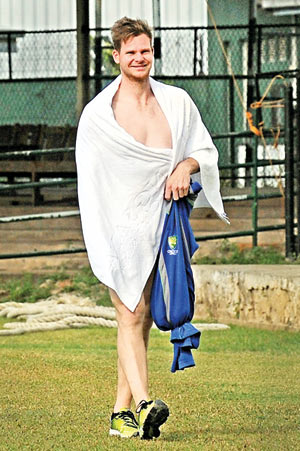Captain deserting ship – or deserted?

Was he getting ready for a long walk? - Pic by Amila Gamage
Having gleefully watched the current cricket series against Australia and revelling up to now in the success of our cricketers, I have been musing about this peculiar custom they have in Australia of dethroning their leaders in mid -career. At the October 2007 federal election, Australian voters elected the Labour Party led by Kevin Rudd to power by a landslide. In June 2010, even before the poor prime minister had completed his first term in office, the power-brokers of the party decided that he had to go and deposed him, imposing his deputy Ms. Julia Gillard on the Australian people as party leader and prime minister.
Despite this surprising “fix the problem by sacking the leader” deposing of the elected prime minister, the new PM Ms. Gillard unfortunately proved less popular with the people than Mr. Rudd had been – and at the next election, the people voted the Labour Party out and elected into power the Liberal Party which had until then been in opposition. Tony Abbott, the Liberal party leader, became prime minister and served for the full term of three years, being returned to power in 2013 with a thumping majority. What then happened?
Less than two years into his second term as PM, in what has become a typical Australian act of pulling the rug out from under their feet and dethroning leaders in mid-air, the Liberal Party deposed Mr. Abbott and installed senior cabinet minister Malcolm Turnbull in his place as leader and prime minister. Turnbull governed Australia as PM from September 2015 and called an election in July 2016 – at which he was returned to power with a vastly reduced majority, just one seat ahead of the opposition in the Australian House of Representatives. And I have begun to think that the latest victim of this peculiar Australian custom of cutting down tall poppies and changing horses in midstream is their poor cricket captain Steve Smith.
Smith arrived in Sri Lanka last month as the captain of a powerful contingent – the leading test team in the world that had not lost a single test match since he was appointed captain. This week, that reputation is in tatters. The high-flying team has had its image of invincibility shattered, having lost four of their last five encounters against lowly Sri Lanka – a 3-0 whitewash in the test series and one of the two ODI matches played so far. Poor Steve Smith. A month ago, he was riding the crest of the wave as leader of the best team in the world.
He had never lost a match as captain, he had been handed the ICC trophy for the Number One cricket team in the world, and he was probably hopeful that this series against seventh ranked Sri Lanka (a team that had just returned after a disastrous tour of England) would be a mere formality. But just as Hubris is often followed by Nemesis, Smith now has to depart – deposed in ignominy after his team’s humiliating showing in this country. It is not like Australians to give up. This after all is the nation that fought at Gallipoli and Long Tan, a tough nation whose soldiers have earned a well-deserved reputation for fighting doggedly against heavy odds and not giving up, of ‘Never Saying Die’ until they were dead, quartered and buried!
Is Captain Smith deserting a sinking ship? Has he been psychologically unable to cope with the morale-lowering defeats of his team by these young and unheralded Sri Lankans? Or is there more to this “change of leaders” than meets the eye – that the captain himself is being deserted by his coach and selection committee? When a team does badly, Rod Marsh (no relation, admittedly, to current players Shaun and Mitchell Marsh, who are the sons of former Australian cricketer Geoff Marsh) and his co-selectors need a scapegoat – and Smith appears to have become the sacrificial lamb. He is being sent home in the middle of a tour while vice-captain David Warner has been given the task of leading the gutted Australian team for the rest of the One Day series.
We wish David Warner well. He is a young man with great skill as a batsman, a tough competitor but well respected by his opponents – and this will be a great opportunity for him to show his mettle as a leader. Sri Lankan fans were quick to note that Warner was the first Australian player to come up to and congratulate Dhananjaya de Silva at the end of the first day after de Silva made his maiden century in the third test match.
Darren Lehmann, the Australian coach who older fans like me will remember as the first Australian cricketer to be actually fined and punished by the ICC for racial vilification (he received a five match ban for racially abusing the Sri Lankan cricketers during the Tri-series played in 2003 between Sri Lanka, England and Australia) has been quick to defend the decision to send back Smith.
Lehmann stated “We’d planned it for a long time. Steve took some convincing – but there is no doubt that, but as a coaching and selection panel we have to make sure he is fresh and ready to go for Australia.” It is certainly sad for Smith that the coach and selectors are admitting that his being able to “go for Australia” in Sri Lanka is no longer a possibility after his team’s disastrous and morale-sapping showing in this country.
Having admired Steven Smith as a great cricketer, Citizen Silva can only hope that he will not be deposed as leader – like his prime ministerial compatriots Kevin Rudd and Tony Abbott – while he is deemed to be “resting” back home.


